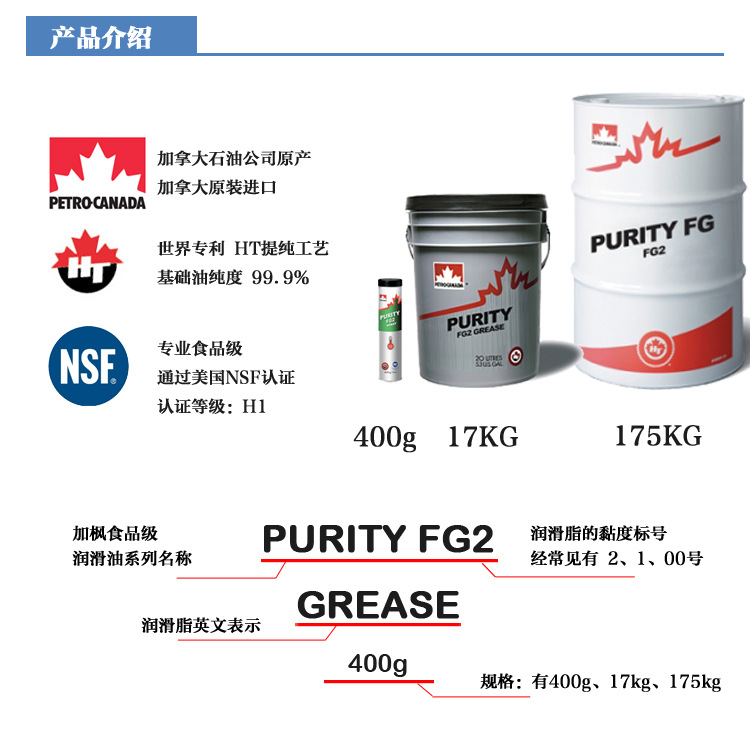在食品企业冷库工作的链条,如果没有耐低温的链条油,就会因为润滑油冻住而无法正常运转。很多食品机械特别是肉类加工厂,每天都要用大量的水来冲洗设备,溅到设备润滑点的水很容易被普通润滑油中的添加剂吸收,导致润滑油乳化,进而在高温下发生油品氧化反应,产生
结焦、油泥和胶状物质,使润滑油很快变质失效,润滑失败,造成机械损坏。
 First of all, it must have excellent lubrication performance, and second, it must meet the requirements of relevant food safety regulations before it can be called food-grade lubricants. The biggest difference between food-grade lubricants and ordinary lubricants is that their components, including base oils and additives, are non-toxic and harmless. Occasionally, they do not pollute foods and can still ensure food safety. Since food-grade lubricants are specifically designed for the working environment of food machinery, such as high/low temperature, high humidity and other design formulas, they generally require very good antioxidant, high-temperature and anti-emulsifying properties. Many domestic small and medium-sized food processing enterprises, especially in North China. Many of them mentioned that lard, peanut oil and salad oil are used to lubricate food machinery when necessary to meet their perceived pollution-free requirements. This is a conceptual error and may be related to the current lack of clear regulations and propaganda in the country. Not to mention that its lubrication performance is far less than that of professional lubricants. These things are used in high temperature and high humidity environments. Soon, bacteria, molds, and spoilage will grow, producing toxic and harmful substances, thus contaminating food.
The chain working in the cold storage of food enterprises, if there is no chain oil that is resistant to low temperatures, it will not be able to function properly because the oil is frozen. Many food machinery, especially meat processing plants, use a lot of water to flush the equipment every day. The water splashed on the lubrication point of the equipment is easily absorbed by the additives in ordinary lubricants, causing the lubricant to be emulsified, and then the oxidation reaction of the oil products occurs at high temperatures. The production of Coke, oil mud and colloidal material, so that the lubricant quickly deteriorated, the lubrication failed, causing mechanical damage.
First of all, it must have excellent lubrication performance, and second, it must meet the requirements of relevant food safety regulations before it can be called food-grade lubricants. The biggest difference between food-grade lubricants and ordinary lubricants is that their components, including base oils and additives, are non-toxic and harmless. Occasionally, they do not pollute foods and can still ensure food safety. Since food-grade lubricants are specifically designed for the working environment of food machinery, such as high/low temperature, high humidity and other design formulas, they generally require very good antioxidant, high-temperature and anti-emulsifying properties. Many domestic small and medium-sized food processing enterprises, especially in North China. Many of them mentioned that lard, peanut oil and salad oil are used to lubricate food machinery when necessary to meet their perceived pollution-free requirements. This is a conceptual error and may be related to the current lack of clear regulations and propaganda in the country. Not to mention that its lubrication performance is far less than that of professional lubricants. These things are used in high temperature and high humidity environments. Soon, bacteria, molds, and spoilage will grow, producing toxic and harmful substances, thus contaminating food.
The chain working in the cold storage of food enterprises, if there is no chain oil that is resistant to low temperatures, it will not be able to function properly because the oil is frozen. Many food machinery, especially meat processing plants, use a lot of water to flush the equipment every day. The water splashed on the lubrication point of the equipment is easily absorbed by the additives in ordinary lubricants, causing the lubricant to be emulsified, and then the oxidation reaction of the oil products occurs at high temperatures. The production of Coke, oil mud and colloidal material, so that the lubricant quickly deteriorated, the lubrication failed, causing mechanical damage.

